Blog writers for hire are a dime a dozen.
Finding them isn’t the problem. They’re everywhere you look. It seems like everyone wants to be a writer (maybe because writers get to work from home in their pajamas and make their own hours).
But discovering writers that are knowledgeable, experienced, and easy to work with in a time that everyone is looking for popular side hustles?
Therein lies the challenge.
What you’re looking for isn’t just a good writer but a writer who can add value to your blog.
This can mean helping it rank in the SERP and, ultimately, help your blog drive conversions (whether it’s an affiliate blog trying to make a commission or a blog for a SaaS company trying to get more leads).
Writers who can do that are few and far between.
Our content marketing agency produces over 300+ articles/month, and we hire the best writers to help us write content for our blog and our clients.
So, if you’re planning to launch a blog, here are the five most popular ways to find blog writers for hire, with pros vs. cons for each.

Get long-term ROI.
We help you grow through expertise, strategy, and the best content on the web.
1. Job Boards

The pros of job boards:
The most obvious starting point for most is a job board.
Spend a few bucks, throw up a simple “blog writers for hire” listing, and freelance bloggers start trickling in moments later.
A steady stream of people for only $70 bucks? Can’t beat that.

Job boards excel because they’re relatively passive. You can control and predict the inflow of talent. You can spend $X to get Y applicants within Z weeks.
It’s repeatable, scalable, and predictable. And you can (more or less) dictate what you’re willing to pay.
These are all great hallmarks for successfully scaling content.
So what could possibly be wrong with job boards?
The cons of job boards:
Before you run off to post a job ad on ProBlogger there’s something you ought to know:
Job boards are the easiest way to attract new people because the blog writing market is 90% filled with the least experienced and least talented.
These are content writers who haven’t found their niche or voice and don’t have enough work to sustain themselves. They’re actively looking, which means they’re not established and not refining their blog writing skills.
It sounds subtle. But just like the experts from our MasterClass review can attest, it’s the details that make all the difference!
That may not be a bad thing necessarily. You might be looking for freelance writers that you can train and grow.
But, just know that’s going to take much longer than you initially realize – if it even works at all.
Training and developing content writers is labor-intensive. If you’re lucky to find a writer who just “clicks” with your style, brand, and goals, then hang on to the person. Because training a freelance content writer into a content marketing writer who actively writes for your target audience while advocating your brand is difficult. Not impossible. But it is difficult.
But our main point is this: the best candidates aren’t (usually) scouring the ProBlogger job boards for work. They’re already booked up or employed somewhere else. Or simply just not looking. A majority of the best writers we’ve worked with came to us as referrals (more on this in the next section).
And in a hyper-competitive space, you need the best of the best.
Job boards can provide a ton of volume. However, that also becomes part of the problem. You’re going to have to sift through A LOT of people – many (or most) who’re unqualified.
We’ve personally reviewed over 2,000 freelance blog writers in the past year alone. So you better have a system for filtering and vetting and qualifying before reaching out.

If not, you risk letting the few good ones slip through your fingers, while hiring managers waste time manually sorting through all the other junk.
Content writer assessment tests and skills assessment tools like Adaface are crucial in the hiring process, allowing you to assess more content writing applicants in an efficient manner.
2. Referrals

The pros of referrals:
The best leads for a service company often come through personal referrals. So, too, do new hires.
Think about it…
You ask pre-qualified people, whose work and style you respect, for leads from peers just like them.
It’s no different than dating. You’ve got a much better shot closing the deal (metaphorically speaking, of course) with a friend of a friend than some random schlepper at the local dive bar.
Let’s also lump social into this, because it’s kinda, sorta, a form of personal referrals.

By asking Twitter for a referral, you’re likely going to get some quality applicants. Content marketing and content writing experts are taking to Twitter, as it allows them to share industry knowledge and build a platform.
That being said, how many of your team is currently active on Twitter? The size of the network matters when it comes to referrals, which brings us to. ..
The cons of referrals:
Referral results are directly related to the size of your network.
If it’s big, and you’re well known, dozens will flow in.
But if not? You’ll struggle to attract enough prospects to make it worth it.
Successfully scaling content with enough top-notch talent means you need to look at hundreds, not dozens, of people.
Referrals might point you in the right direction. They might shake through a few leads.
But the chances of the perfect diamond lying in a tiny rough are slim to none if you need more than one.
3. Cold Research

The pros of cold research:
‘Cold’ anything usually implies bad. Cold calls, cold email, cold bologna. (Gross.)
Not in this case, however.
Cold research is typically one of the best ways to find A-level talent.
It’s also surprisingly simple.
You run a Facebook marketing app. So you pull up the top ten blogs on Facebook marketing. Read a few of the recent posts, highlight the ones you like, and see who wrote them.
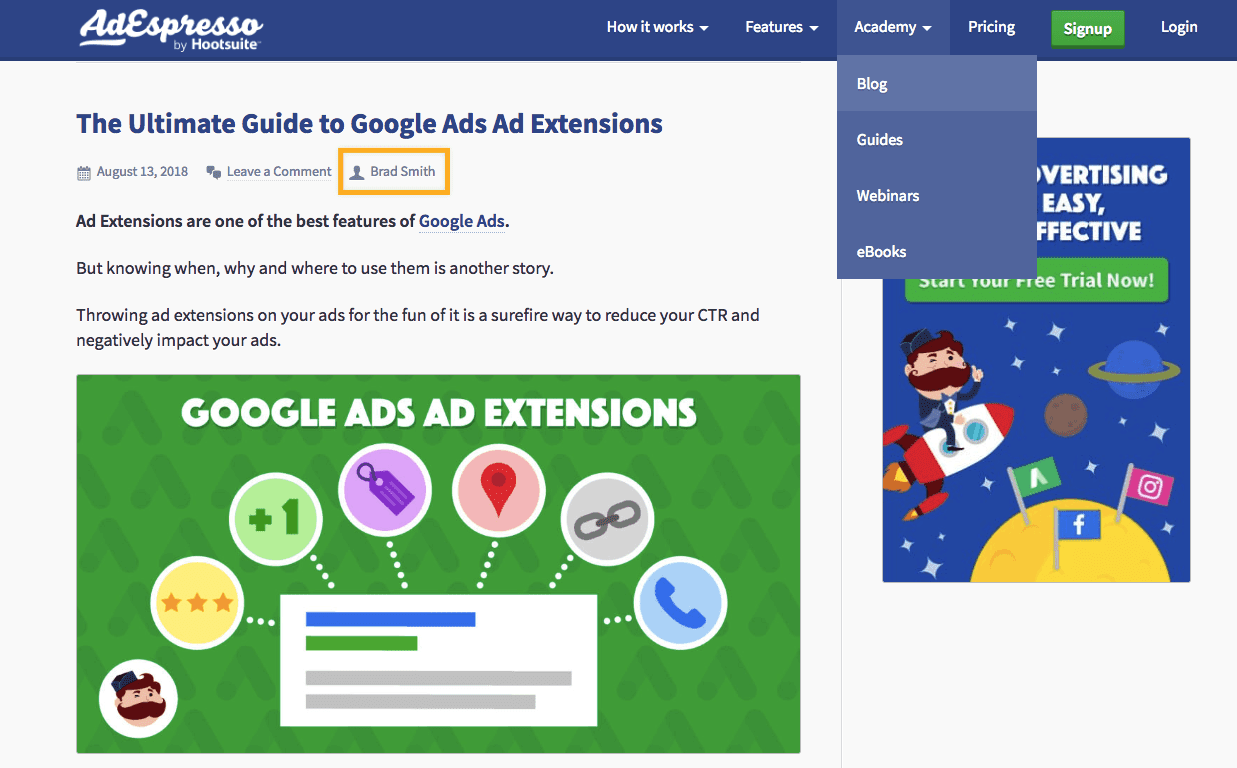
Next, do a quick site search for that person’s name to (a) see more of their work, and (b) make sure they’re not an in-house employee of that company already. The chances are it was a freelancer or a marketing expert who wrote a guest post for the blog. If it was a freelancer, you’re in luck.

Then, start analyzing their previous content. Is it good? (What does “good” even mean to you?)
Ideally, you have a few blog KPIs in your back pocket. You need to know the target a blog writer should be aiming for.
That way, when you see that they can (a) describe the pain point your audience experiences and then (b) seamlessly move into the ‘product placement’ portion that features how to solve it with your app, you know you’ve got a winner who can drive leads.
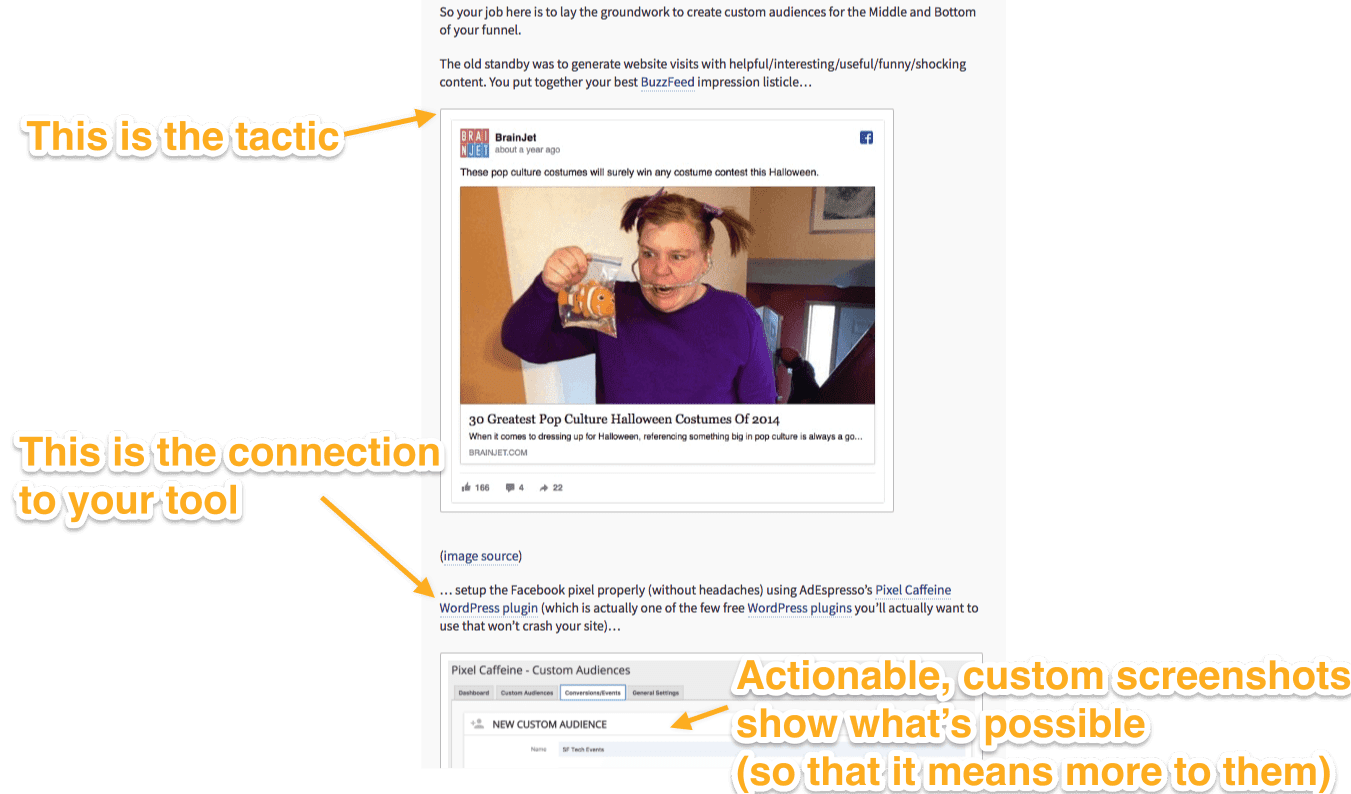
Now, start reaching out. This is a recent LinkedIn message we received. And that’s all it took to get the ball rolling.
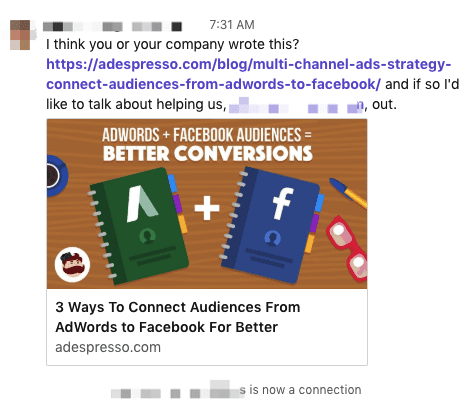
The cons of cold research:
Job boards are like casting a net behind the back of a boat and hoping for the best. Cold research, on the other hand, is like spearfishing. You’re down in the depths, hunting.
Your odds of finding an awesome (read: not cheap) professional blog writer goes up tremendously. But it also requires a lot more manual work on your part.
Doing this to find a few options might take the better part of half a day, probably more if you want to test a few.
It also assumes you know what you’re looking for. You can spot talent. And you have a legit strategy in place so that the mercenary can easily hit the ground running.
That, too, isn’t always the case.
4. Content Writing Services
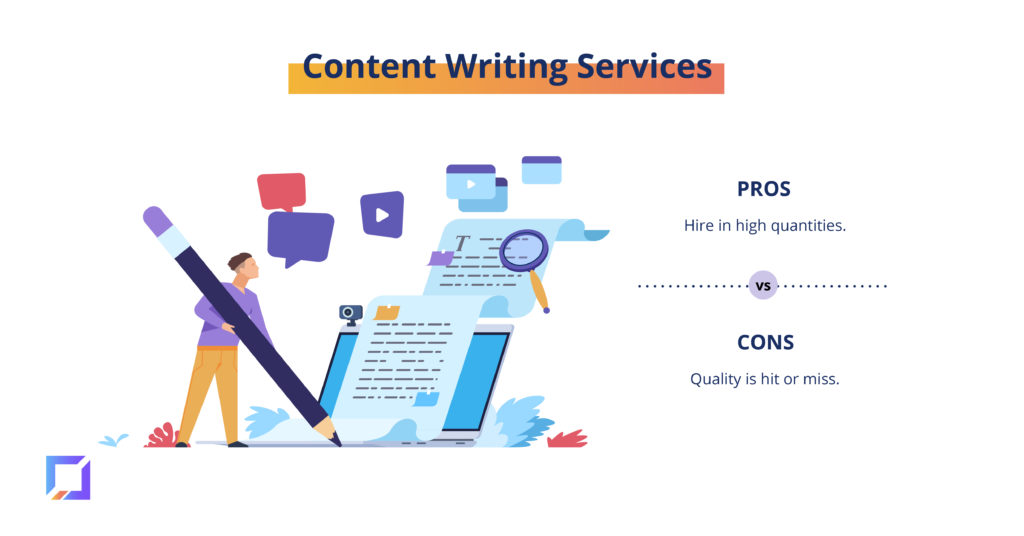
The pros of content writing services:
Content writing services are platforms that provide access to a pool of talent, and sometimes even help match you with individuals based on skillset or preference.
The other massive benefit using a blog writing service is the ability to scale. These platforms can provide you with endless options, so going from 5 blog articles a week to 50 isn’t such a big deal.
Plus, you (typically) get a well-oiled process.
Working directly with freelancers is good when (a) you know how to manage people and (b) they’re good at the business end of the equation, which isn’t always the case, especially, when they’re not pro-level freelancers who’ve been around the block a few times.
So, content writing services introduce professional management to keep things like requirements, expectations, turnarounds, and payment terms nice and easy.
The cons of content writing services:
Content writing services can help you scale content. However, quality is often hit or miss.
These companies provide a platform to help manage the logistics. But at the end of the day, you’re still left on your own to deal directly with the writer for the end product.
This commonly backfires when (a) you’re not 100% clear on objectives, (b) you can’t quantifiably measure or ‘grade’ what they’re providing, and (c) if they’re not experienced enough.
These platforms don’t do any internal reviews and edits before you get content. They’re not fact-checking points or always checking for plagiarism.
For example, direct word-for-word plagiarism is easy to spot. But we’ve taken this a step further, testing a few content writing services ourselves, and found instances of their writers basically just rewriting other popular content.
Check out the two major benefits highlighted in this piece we tested:

Now, compare it to one of the top-ranking sites on that SERP:

They basically just went to see what the big brands were already writing and rewrote the same crap. Zero originality. So you can expect zero results, too.
All of this means you’re still left to do more hand-holding, investing your own time to ‘shape’ the writer to produce the kind of content you want.
Because there is no central oversight, successfully scaling quality content becomes a challenge, too. You’re working with a bunch of isolated individuals. They’re not cooperating. They’re not privy to what the others are doing (and finding success with).
This means the buck, again, stops with you to figure it all out, manage it, and make sure the random team being stapled together is keeping up with your ever-evolving standards.
5. Content Marketing Agencies

The pros of content marketing agencies
Content marketing agencies build upon what content writing services do well, while also raising quality with experienced blog writers.
(At least, that’s how it should work in theory. But it doesn’t always in reality. Read the Cons below to find out why.)
So, on the one hand, you get scale. You can start small with a few articles a month, ramping up exponentially as results warrant.
A few months ago, we had a new client start with five articles. When that went well, we bumped up to 15/month. Month three? 50+ — all 2,500 words and up, with a dedicated team of three experienced writers and an editor.

While on the other hand, you also get internal quality control to make sure all content you receive is consistent with your style guidelines and free of errors or plagiarism.
Plus, they can help with strategy. And are experienced at working directly with other teams (SEO, sales, etc.), so you won’t have to oversee every little detail.
The cons of content marketing agencies:
Agencies sound like the dream for those seeking the best of the best (with a budget to match).
And that’s the first issue:
The good ones ain’t cheap.
Next to working directly with an expert freelancer, you’ll end up paying the most with a dedicated content agency.
If you get the quality to match? It’s an investment that’ll pan out.
But if not? You’ll overpay for stuff that won’t move the needle enough to make it a better bet than the other options listed here.
How can you tell good content agencies vs. bad ones?
First, make sure they specialize in content creation — not just distribution. (Preferably, the specific kind of content you’re interested in.)
Second, make sure they specialize (or at least can provide) vertical-specific samples. (At least, stuff that shows the same underlying principles that could be applied to your vertical.)
Otherwise? They won’t have the ability to scale, and the team won’t be experienced enough to justify the higher rates.
If you come across an agency that does content and SEO and website design and email marketing for the construction industry and accountants and retail and banking and mortgage brokers and personal finance…
Run and hide.
Tips to Help You Hire the Best Writers for Your Blog
We’ve talked about finding blog writers from job boards, referrals, cold research, content writing services, and content agencies.
Let’s take a step back and give you tips we’ve learned about finding quality writers, that you can use no matter which avenue you take.
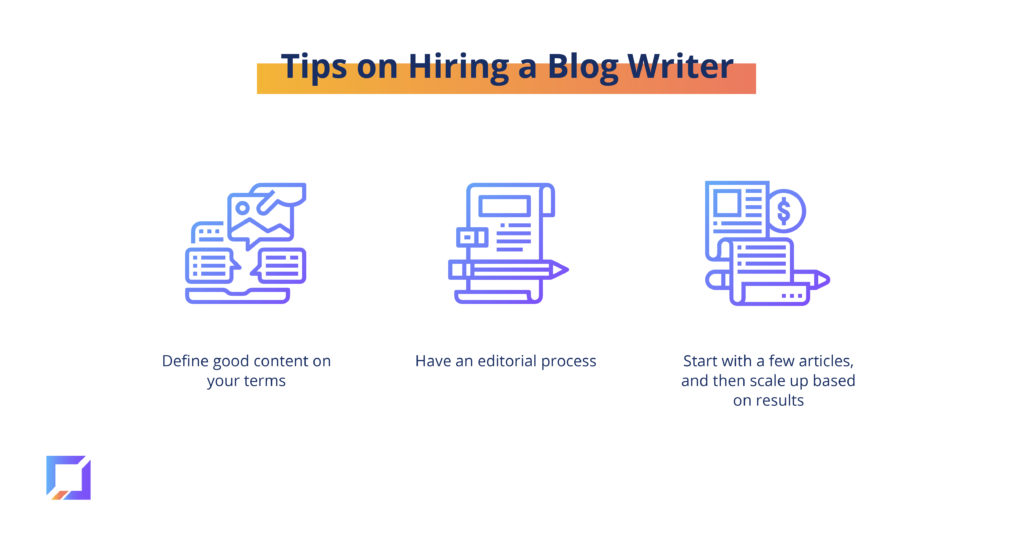
Be able to explain what good content writing is to you
People like to say content is king. And it’s true, the quality of content is critical when it comes to having your piece rank in the top 3 of the SERP where you’ll get increased engagement or on page two, where no one will ever see it.
And here’s the thing: good content has a definition. The problem is most people don’t know it. This is because what makes a piece of content “good” changes over time and depends on your industry (because it depends on what is currently ranking).
If you’re hiring a full-blown content marketing agency to develop a content plan and schedule for your company – then it’s not as required that you are able to define what good content writing is. After all, the agency is paid to find that out for you.
But if you’re working off of job boards, referrals, cold research, and content writing services, you better be able to explain to your new blog writers what makes a post good vs. a piece of garbage that no one will ever see.
You can find content marketing agencies that specialize in any niche. For example, you can find marketing agencies specializing in the hotel industry or in the real estate space.
Have an in-house onboarding process
On the one hand, you want your blog writer to work out. On the other hand, you’re likely hiring a freelance blog writer because you do not have the capacity, at the moment, to recruit and groom a full-time in-house writer.
This means a freelance blog writer needs to be as good, and as reliable as a full-time employee that you talk to daily, without being a full-time employee that you talk to daily
This is hard to do. We’ve found the best way to help your new blog writer succeed is to have a process, but this can be difficult for small business owners who aren’t used to managing content creation, line edits, and revision after revision in Google docs.
All that being said, it’s important to understand that if you just give a writer a topic (or share them on the keyword you want covered) with little to no guidance, then you’re relinquishing control on what you receive. The writer may turn out (by pure luck) to be a great fit.
But even if that’s the case, luck isn’t scalable.
Here are some questions to ask before you assign your new blog writer an article:
- What’s the ballpark minimum and maximum word count?
- Who is the target audience of the blog post?
- What is the goal of the blog post? (Is it to get a reader to click an affiliate link, to subscribe to a newsletter, etc.)
- What is the tone of the article? Friendly, professional, cautious? As much as possible, provide an example of a piece of writing that “captures” the tone you want for your blog.
- What is the turnaround of the article? Basically, how long from when you assign it to a writer do you want it back?
As you get more advanced in managing content, you can start to break it down even further:
- How long should each paragraph be?
- How many internal links should each post have? How many external links would you like in a piece, and are there any sites you don’t want to link to?
- Is the freelance writer providing images? If so, what kind?
Come up with a tiered length of engagement
Good freelance writers respond well to job security. Do you think they like applying on job boards and sending out samples of their portfolio every day?
You don’t want to promise anything you can’t deliver (and obviously the writer must be a good fit) but being able to tell a prospective writer that you’ll start them at 1 article a week at first and, if it works out, they could be raised to four articles a week for three months tells the writer you’re serious and gets them more motivated on working out.
This also helps with paying your blog writers, as volume and length of engagement can impact the rate, which brings us to our last section.
How Much does it Cost to Hire a Blog Writer?
A general blog writer will charge anywhere from $25 an hour to $50 an hour. That number can definitely be lower or higher.
If you’re hiring a blog writer who also offers copywriting skills and you want them to update the copy, then their rate will likely be higher because they can attest to how much their sales copy helps convert readers.
If you’re hiring a blogger and are offering a byline, you might be able to get a reduced rate as bylines help turn an amateur article writer into a professional freelancer. (Note: Make sure it’s also in your best interest to offer a byline. Once you offer a byline, that writer – and by extension what else they write, including their social media presence – is part of your brand.)
If you’re working with content writing services, the rate will be significantly lower than $25 an hour. (This is because content writing services are basically offering entry-level writers who also often use AI tools to help them write faster. If you’re a writer who has an impressive portfolio and a long list of bylines, you’re not working at those types of services.)
The better question is, how much can you pay for a professional blogger?
To answer that question, you not only need to understand your content strategy or overall content goals, but you also need to understand SEO and content marketing and how long it’ll be before you see a return on investment (ROI).
For example, if you’re writing a blog post that’s aimed at generating new leads for your SaaS company and once the post is written, you’re going to spend heavily on paid marketing to get it promoted across Facebook and LinkedIn, then that’s a different ROI equation then writing a blog post that’s going to rank organically in Google and serve as top-of-funnel-content to help with your brand.
Conclusion
Blog writers for hire are everywhere.
The barriers to entry are low. Anyone, anywhere, can say they write for topic X and industry Y.
Unfortunately, the signal to noise is similarly low. Sifting through them all becomes the issue. Separating the excellent ones from all the other crap out there becomes problem numero uno.
Finding a great writer, or a team that consistently produces great content, is rare as it is valuable.
Each of these five options is good for one reason or another. Which means they each have their own drawbacks, too.
Some are cheap. Some are expensive. Some are fast. Some are slow. Some are easy. Some are challenging.
The key to finding a blog writer for hire is to know exactly what you’re looking for, and then aligning expectations (budget, turnaround times, quality) proportionately.




